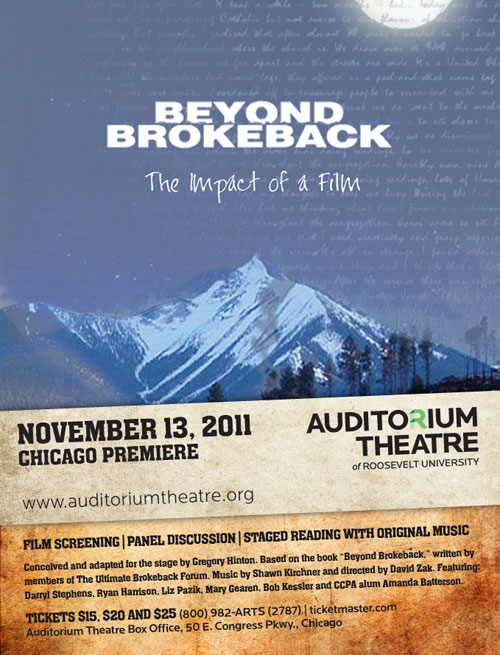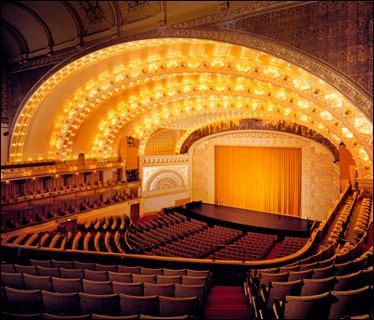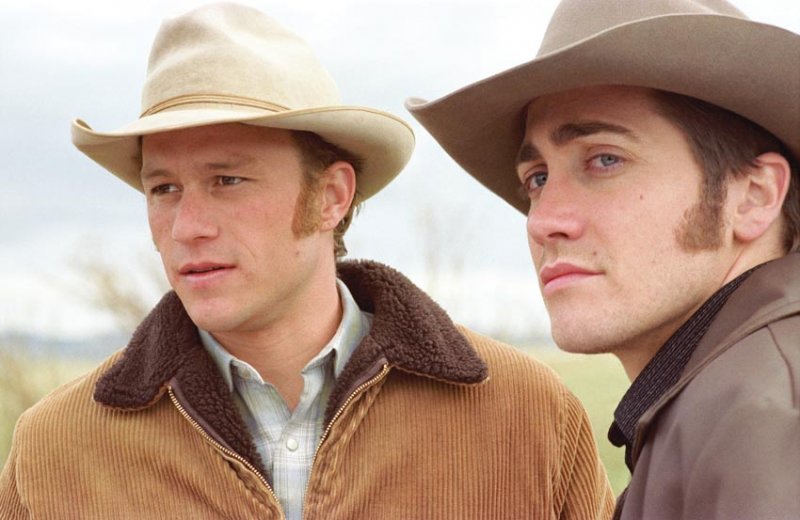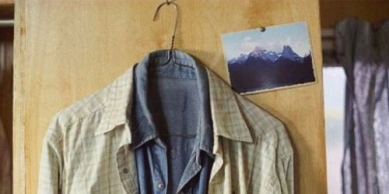
Last Sunday, Mark and I attended a special program called "Beyond Brokeback" at Chicago's Auditorium Theater. This was a special, big-screen presentation of 2005's "Brokeback Mountain", followed by a brief panel discussion, and a performance of an original reading and music performed by members of the Ultimate Brokeback Forum.
We stumbled upon this event by accident about three weeks ago. On a leisurely walk through our favorite Andersonville neighborhood, we dropped by the Chicago Filmmakers' storefront to check out what was new. On the entrance table crowded with information, we spotted the promotional "postcard"---an appropriate way to advertise this particular program.

It was an awe-inspiring experience to view "Brokeback Mountain" in the surroundings of the big, historic (1889) Auditorium Theater. It had been five years since we saw it on a big screen. The projection was crisp and the sound system was exquisite. To see "Brokeback Mountain" in the way in which it was intended to be seen, even after having watched the film many times on suburban screens and home video, had the same gut-wrenching impact it did on my first viewing.
* * * * * *

The opening thirty minutes of "Brokeback Mountain" are as perfect a work of filmmaking I have ever seen. This idyllic sequence, removed from civilization, in which Ennis and Jack transcend their sheltered, inarticulate origins and find in each other a love they can't explain, let alone understand, stands on its own as a complete short film. That's why the remainder of the movie, where the passing of the characters' years is as compressed as their lives, which inevitably trap and confine them, is so utterly heartbreaking.
And then there is the pivotal scene in the tent, the focal point of all of the controversy, the hate, the satire, the fear, the held breaths, the discussion that the film inspired for months after its release. After several years, and repeated viewings, this two-minute sequence remained for me as powerful as ever. I was struck by the passionate violence of it, as though someone who is about to drown finally surfaces, gasping for life.

This is the scene that changed everything for these characters, for audiences, and for Mainstream Filmmaking. This uncontrollable, desperate sexual encounter by these fumbling, dreamy characters, icons of American masculinity, instictive and animal-like in its intensity, was an historic movie moment. Try as it might, Hollywood could not deny that after this scene, nothing would ever be the same for moviegoers or filmmakers. Hollywood instead denied the film a Best Picture Oscar, in spite of the most universal critical acclaim ever earned by a nominee that lost in that category.
"Brokeback Mountain" is a very rare film indeed, in which every scene, every moment is necessary, each piece of music captures the emotional resonance of a sequence, each camera setup is perfect to the exact millimeter, every line reading is inevitable, essential. Everything moves toward the eloquent final image, in which a man, touched beyond his ability to fully contain his passion, finds his life tragically reduced to two bloodied shirts and a postcard. His view, no longer that of a vast and beautiful wilderness filled with possibility, becomes a small glimpse at a desolate field, framed from within a murky mobile-home window.
* * * * * *
After the screening, with only 15 minutes to recover from a deep sense of quiet and sadness, we stayed for a panel discussion. The panel included Jean de St. Aubin, Executive Director of the Gene Siskel Film Center; Larry Howe, Professor of English at Roosevelt University; and Bruce Jenkins, Professor of Film, Video, and New Media at the School of the Art Institute of Chicago. All were introduced by Dr. Chris Chulos, Chair of the History Department at Roosevelt University.
Aubin recounted some interesting history around the film's critical reception, finishing with an excerpt from Roger Ebert's original 4-star review. Jenkins had some good insights onto the psychology and sociology of the film. Howe was less impressive, deconstructing the film in the typically dry scholarly fashion that sucks out all of the passsion and fun one brings with them to the art of film.
I was proud of Mark, who rose for a question, and received much applause for his comments. Mark asked why, after "Brokeback", Hollywood still finds it difficult to make more authentic gay films, or include more incidentally gay characters, instead of cloaked material full of innuendo like "J. Edgar". The panel struggled to find an answer, retreating into titles form 20 years ago, or citing the ever-progresssive filmmakers of Europe. At least they recalled titles like "Milk" and "The Kids are All Right", although, as good as those films are, neither has the visceral impact of Ang Lee's remarkable film.
* * * * * *
Owing mostly to our long drive back to the suburbs, we did not stay for the staged reading, with original music. In a way I regret having missed it; but then, after the power of the film, it would have been difficult to concentrate on another rendering of the story, or to give it the attention and emotional investment it deserved. Maybe I will catch it again in another city, or on a return encore presentation. Perhaps the group can be persuaded to put the performance on DVD, or post on YouTube. Their next performance is scheduled for February in Las Vegas. I wish them all well.


Here you go:
ReplyDeleteBeyond Brokeback video: http://www.youtube.com/watch?v=8WlkfHlqamY